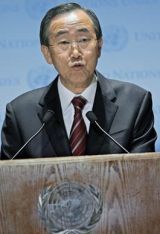UN chief vows action on war-torn Congo and Darfur
Jan 27, 2007 (KINSHASA) — U.N. chief Ban Ki-Moon, on his first visit to Africa since taking office, promised the people of war-torn Congo they could rely on United Nations’ support and vowed to tackle regional crises gripping Darfur and Somalia.

He acknowledged the enormous challenge facing the former Belgian colony at the heart of Africa after a 1998-2003 war that killed some 4 million people, mostly through hunger and disease.
“It is a gigantic task, which I know well from having myself grown up in a country totally ravaged by war,” said Ban, a former South Korean foreign minister who started work as U.N. secretary general earlier this month. “You can count on us.”
Ban later told a news conference he would travel to an African Union summit in Ethiopia’s capital Addis Ababa on Monday to personally discuss regional conflicts with the continent’s leaders, particularly the four-year-old crisis in Sudan’s western Darfur region and ongoing violence in post-war Somalia.
“My priority as secretary-general of the United Nations is to contribute myself to the resolution of all regional conflict issues,” Ban said. “(In Addis Ababa) I’m going to engage myself with many African leaders, including the president of Sudan, to discuss all these very hot regional conflict issues.”
Some 200,000 people have died in Darfur since rebels took up arms in 2003, accusing Sudanese President Omar Hassan al-Bashir’s government of discriminating against the province. Khartoum responded by arming local ethnic militias.
Al-Bashir has agreed in principle to a hybrid U.N. and African Union peacekeeping force in Darfur but not yet given consent for the deployment of 10,000 U.N. troops.
WIDESPREAD RIGHTS VIOLATIONS
Ban’s visit to Congo came amid concerns that a meeting of the Security Council in the middle of next month could decide to reduce the strength of the U.N. mission in Congo (MONUC) from its current level of 17,000 peacekeepers.
Despite a 2003 peace accord that officially ended Congo’s conflict, human rights violations are widespread across the country, particularly in the volatile east, where Congo’s army regularly clashes with armed militias.
“The creation of a professional army and police force, well paid and well equipped, must be a priority,” Ban told lawmakers. “Progress in this crucial area will allow MONUC to transfer responsibility for security to national and local authorities.”
“This transfer will be carried out progressively and according to a calendar to be agreed with the government.”
On the eve of Ban’s visit to Congo, British aid agency Oxfam said a withdrawal of the U.N. mission in Congo (MONUC) would return the mineral-rich state to chaos.
Humanitarian workers estimated that more than 1,200 people die a day in Congo from violence, hunger and disease, in what some call the world’s worst humanitarian crisis.
President Joseph Kabila took office in early December as Congo’s first democratically-elected leader in more than 40 years, pledging to disarm militias marauding across swathes of the east, some with support in neighboring Rwanda and Uganda.
“It is imperative to attack resolutely the problem of armed foreign groups, which continue to operate in the country and commit crimes against the population,” Ban said. “MONUC is ready to help the government to find a solution to this urgent issue.”
(Reuters)
